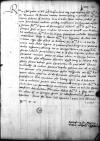Binis atque urgentissimis litteris Paul III (Alessandro Farnese) (*1468 – †1549), 1493 elevated to cardinal; 1524 Cardinal-Bishop of Ostia; 1534-1549 Pope⌊sanctissimi dominiPaul III (Alessandro Farnese) (*1468 – †1549), 1493 elevated to cardinal; 1524 Cardinal-Bishop of Ostia; 1534-1549 Pope⌋ nostri ex Venice (Venezia, Venetiae), city in northeastern Italy, capital of the Republic of Venice⌊VenetiisVenice (Venezia, Venetiae), city in northeastern Italy, capital of the Republic of Venice⌋ ad Rome (Roma), city in central Italy, on the Tiber river, seat of the Holy See⌊RomamRome (Roma), city in central Italy, on the Tiber river, seat of the Holy See⌋ vocatus humanissimeque a pontificia sanctitate exceptus felicius, quam hactenus vivo et valeo, spem certam habens, quod meae humilitatis condicio quandoque consolationem diu exspectatam assequetur.
Ceterum, Reverendissime Domine, quia ob sincerissimam fiduciam, quam de Reverendissima Dominatione Vestra semper gessi et gero, consului germano et cancellario meo, magistro Olauo, ut mandatum Paul III (Alessandro Farnese) (*1468 – †1549), 1493 elevated to cardinal; 1524 Cardinal-Bishop of Ostia; 1534-1549 Pope⌊sanctissimi dominiPaul III (Alessandro Farnese) (*1468 – †1549), 1493 elevated to cardinal; 1524 Cardinal-Bishop of Ostia; 1534-1549 Pope⌋ nostri de aliqua provisione in ecclesia Varmiensi impetraret. Rogo et obsecro Reverendissimam Dominationem Vestram, dignetur ad Olaus Magnus (Olof Månsson, Olaus Magni) (*1490 – †1557), Swedish historian and geographer, brother and successor of Johannes archbishop of Uppsala⌊illius viriOlaus Magnus (Olof Månsson, Olaus Magni) (*1490 – †1557), Swedish historian and geographer, brother and successor of Johannes archbishop of Uppsala⌋ merita erga Christi fidem et ecclesiam (quae Paul III (Alessandro Farnese) (*1468 – †1549), 1493 elevated to cardinal; 1524 Cardinal-Bishop of Ostia; 1534-1549 Pope⌊sanctissimo dominoPaul III (Alessandro Farnese) (*1468 – †1549), 1493 elevated to cardinal; 1524 Cardinal-Bishop of Ostia; 1534-1549 Pope⌋ nostro et toti Romanae curiae satis cognita et probata sunt) benignis ac paternis oculis respicere efficereque, ut magistro Georgio Dunner (si possibile fuerit) aliunde provideatur, aut, si id fieri nequeat, saltem ad pensionem annuam, prout Olaus Magnus (Olof Månsson, Olaus Magni) (*1490 – †1557), Swedish historian and geographer, brother and successor of Johannes archbishop of Uppsala⌊magister OlausOlaus Magnus (Olof Månsson, Olaus Magni) (*1490 – †1557), Swedish historian and geographer, brother and successor of Johannes archbishop of Uppsala⌋ eidem magistro Georgio Dunner perscribit, sese obligatum fateatur, quod utique eo libentius atque fidelius facere debeat, quia canonicatus ille post obitum Henrich Snellenberg (†1539), son of a Thorn (Toruń) merchant; studied in Cracow, Cologne, Ingolstadt, and Frankfurt an der Oder; from 1499 to his death Canon of Ermland (Warmia) (took the canonry in 1501) (SBKW, p. 226-227; ZINS 1959, p. 431-432)⌊Henrici SnellenbergHenrich Snellenberg (†1539), son of a Thorn (Toruń) merchant; studied in Cracow, Cologne, Ingolstadt, and Frankfurt an der Oder; from 1499 to his death Canon of Ermland (Warmia) (took the canonry in 1501) (SBKW, p. 226-227; ZINS 1959, p. 431-432)⌋ ad nullum prorsus devolui poterat, nisi ad magistrum Olaum, nec poterant eius procuratores ipsum resignare, nec Reverendissima Dominatio Vestra ipsum alicui conferre, cum ad familiarem pontificis post adeptam possessionem omnino spectaret etc. Utcumque tamen haec se habeant, nos in meliorem partem omnia interpretabimur, quae per Reverendissimam Dominationem Vestram facta sunt, nec permittemus amicitiam nostram ea vel alia quavis occasione labefactari.
Felicissime valeat Reverendissima Dominatio Vestra seque tam Olaus Magnus (Olof Månsson, Olaus Magni) (*1490 – †1557), Swedish historian and geographer, brother and successor of Johannes archbishop of Uppsala⌊magistro OlauoOlaus Magnus (Olof Månsson, Olaus Magni) (*1490 – †1557), Swedish historian and geographer, brother and successor of Johannes archbishop of Uppsala⌋, quam magistro Georgio propitium ac indulgentissimum patrem ostendat.


 BCz 247, p. 360
BCz 247, p. 360